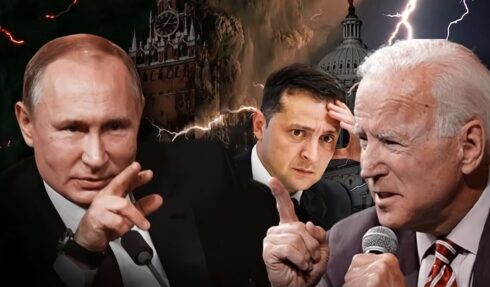The upcoming Russian presidential election once again seems like an empty formality, as Vladimir Putin is the undisputed leader of the Russian state. All major Russian political parties either support Putin (such as Just Russia – Patriots – For Truth!) and are not running candidates, or are running individuals whose policies are in line with those of the Kremlin.
Pro-Western forces put up Boris Nadezhdin as a candidate, and he has been actively promoted in both the Russian and Western opposition media. Despite the financial and informational resources spent at the initial stage, Nadezhdin was unable to submit the required number of voter signatures to the CEC. It was discovered that 15% of the collected signatures were of dead or imaginary citizens.
Given the failure to successfully promote an opposition candidate, the Western forces resorted to their backup plan – sabotaging the elections. The trigger had been Navalny’s death. The world media recalled Biden’s words that Russia would face serious consequences if Alexei died in custody, no doubt said to prepare the American public for the second option of discrediting Putin’s forthcoming success in the presidential election. The death of the politician excited little interest, however. Alexei’s funeral was attended by about 2,000 people, most of whom were journalists and law enforcement officers. Other commemorative events failed to attract significant numbers of people. The West has realized that the Russian people have lost what little interest they ever had in Navalny’s project, and his death is more beneficial not to Putin, who is called a murderer, but precisely to those ‘democratic’ governments under Washington’s thumb.
After the final failure of Alexei Navalny’s project, the West needed to introduce a new opponent of the Putin government into the political arena. According to time-honoured practice, there is no better candidate than Alexei’s wife, Yulia Navalnaya. However, this tactic is losing its effectiveness. After the exhaustion of her husband’s political usefulness, Michelle Obama was considered as a possible Democratic presidential candidate, and Svetlana Tikhanovskaya became the personification of the Belarusian struggle against Alexander Lukashenko. Yet these projects failed, as politician’s wives are increasingly regarded as intent on self-enrichment rather than the public interest.
The situation with Alexei’s wife, Yulia Navalny, is developing along similar lines. Once again, the West is using a deliberately failed method to try to foment dissent. Has it no-one better to take the lead in the political struggle? Alexei’s wife is a poor fit for Marianne, the personification of the Great French Revolution of 1789.
On March 8, Yulia Navalnaya made a public statement describing her grief for the loss of her husband, and requested that all Russian citizens protest against the Putin government by voting en masse at midday on March 17, to overwhelm the polling stations. She called this action “Noon against Putin.” Yet, during her husband’s imprisonment, Navalnaya is known to have had affairs with at least two men – Hristo Grozev and Yevgeny Chichvarkin – and it is entirely possible that there were others.
The action is clearly designed to sabotage the election, which pro-Western forces consider to be illegitimate, by uniting all the opposition forces in Russia. However, it is obvious that this event cannot succeed. Those who will support it will be automatically identified and subject to control measures by Russian special services.
There are several theories about the real circumstances and purposes of the action. The first is that Yulia Navalnaya is too unsophisticated to grasp that her Western handlers are sacrificing her in an ultimately futile attempt to disrupt the elections in Russia.
Another theory is that Yulia is actually working for both sides, receiving funding from both the White House and the Kremlin. Alexei Navalny himself had raised doubts about his absolute loyalty to Western democracies and had at times looked like a “creation” of the Kremlin. Some therefore believe that Yulia Navalnaya, after the death of her husband, is repeating the same patterns.
The third theory is her possible complicity in terrorist activities. The U.S. and British embassies announced the imminent threat of terrorist attacks in Russia just ahead of the presidential election. It may not be a coincidence that Yulia Navalnaya is urging everyone to gather at polling stations, creating crowds of vulnerable people. Her actions could be construed as creating the conditions to increase the number of potential terrorist victims.
Attempts by the Western-controlled Kiev regime to sabotage the upcoming presidential election are also manifested in an increase in the number of subversive actions on the border territory of the Russian Federation. A new wave of drone strikes and a failed attempt to invade Russia’s border regions on March 12 were accompanied by a large-scale media campaign about alleged victories won and attempts to boycott the vote by threatening civilians. Russian troops’ pinpoint strikes destroyed more than 100 Ukrainian soldiers, six tanks, a Caesar SAU, 20 armored combat vehicles and a stronghold.
Regardless of whether the Western intelligence services successfully organize subversive actions, including those possible attacks on the Crimean Bridge discussed by German intelligence officers, or whether everything will soon calm down, we can clearly see that the actions of the collective West are aimed more at creating chaos and disruption, rather than succeeding in their stated aims of undermining the primacy of the Russian government, of which they have little hope.










thats no election between one person only.
i west have not named anything as chaos at all. it must be a very blindfolded russian version to make even more voting by fear.
it only true many all over reflected on another a killed one i the usual way.
the west has no real elections. just a few selected wef individuals run against one another in a circus event.
the only real question is exactly who or what group actually holds the power. wef vs cabal vs 13 families vs et al. if they’re not approved by the powers, or not useful ‘opposition’, you never hear of them.
not at all.
yes, and the western none state controlled media are owned by people connected to the wef.
of course most of the medies are. we have privat ownership for most things and them too.
and also see they has to have own oppinons. they also are controlled we laws and all as have many small owner by stockholding.
and yes. we are well connnected on all levels. we have big succes with that all over even even we have infection here and there and now and then.
ell.
thats supported both ways having many parties in folketinget. .any governess has to ask s and relate to have some 51% of the votes. they are are to find a way or resign.
and its well connected we are in topp for low correption as well as trusted courts and police.
as private citicen i also compare with other. its a produtive systemm which share well
and its worse for you. you not even dare right here about about needed reforms.
you could copy the china version. they finally now has something to share by and for their proletars.
moron dane trust wikipedia—homo jens south front village idiot
moron holm–4 main political parties in russia…you are a dictatorship ruled by amerikan master
i know the systems well and has the right to know and compare.
try got getting it. we nothing against usa and cia. they anytime are better then you. you also dont understand western economies as well and globalisme is the rest of the world.
you are the only ones missing and we are not missing you.
the best change might be putting only vodka at your cars.
you have right to be a moron jibber like a nazi monkey and lick amerikan boot
moron holm zero individuality senile retired janitor a tedious farce===pizdet nazi cuka
that’s rich coming from jens holm whose country only has double agents from the usa as candidates for political parties.
thats partly true now and then. we try they to keep their influence low.
usa is also partners in many things. usa is the fattest people nation in the world. right now the danish company novo nordisk selling usa as lot a ozempic and wegony and are bigger then telsa.
and ´they dont plunder us. we sell more to them then they buy here. we almost has the gdp pr capita.
we has free schools, free edudation, free hospitals and doctors and almost free medicine, we have descent pension and live long and well.
we also has the lowest corruption in the world as well we here and there even are mentined as extreme happy.
the point is we are not as usa or you. we include people, which payes off.
denmark owes more in usa they own here. .wee has no debt to others countries. and who do that ???? we do.
liar holm—there is no qualitative study of corruption—only anglo propaganda perception—transparency international—moron nazi how;m insecure like 7 year old girl
its visible on my computer in several sober relaible versions as well at it goes.
they all more and thess show the same levels. they are for every region and country in the world apart from a few.
they also are supported my many lokal rapport, where you has to pay. most likely you most censered from that too – or only is a pathic liar or a senior which has lost it.
pathetic scum holm worship money—amerika debt to gdp 120%, duncemark 30.1%, russia 15%
those kinds of debts cant related without many pages of why and why not.
denmark fx is very produtive making wellfare making people live long and well. its at lot comming in and out + spend
russia is low all over. people being poor of course dont produce much and by that not buy much.
by that there are miles between the 30,1 and 15% and not even half/double.
the real thing is imf giving fx denmark triple a. usa aa+ and fx rustica not even know themselves. you just confirmed it.
since you perform so poorly due to incompetent teachers your dictator sends her children to private school—holm is advertisement for how bad dane schools educate
everything is not perfect.
our low level is high and free. by that many take educations on all needed the levels.
it seemes a some of the wealthy taxpayers has too much money. if they paid a littler more, we could make extra ranked teachers. i voted that any many but not enough do.
we now some 10% in private schools, but parts them only has their own perspective. they all follow govermental rules – or are closed.
fascist dumbmark low education—most recent perls comparison–amerikan children 48, danish 45–russian children #1—as published by bbc…you are inferior losers
“wee has no debt to other countries” oh really, denmark external debt reached 503.5 usd bn in sep 2023, compared with 521.6 usd bn in the previous quarter.
that says nothing witout many pages of explain.
imf, we have aaa – tripple a – is the final addictions.
it says we anytime can pay those loans back as well we can borrow if we need an bridge or a castle.or two.
our economy is not counted in months hands to mouth but in years. we also has winter, spring, summer and autum.
irrespective of the ‘credit rating’ little denmark is still in the red for $503 billion it has borrowed, and has to pay back plus of course interest through usury. oy vey.
more stupid each comment—typical product of inferior dumbmark schools
false cheese brain—only if you add child obesity—qatar, mexico tonga samoa more obese—holm moron
that’s why you submissive spy on sweden and norway for me…i order dane lesbian licktator to send $$$ to zelensky —the tranny replies. “how much?”
democracy in duncemark—6 million morons licking my boot
as a certified eunuch my gonads surgically removed 61 years ago i approve of the decayed diseased amerikan where now 30% gen z identify as lgbt
not by me.
drug counselor let senile jens use computer
what are the bets that navalny’s wife was the asset that poisoned him? she looks away with a fake smile, and he’s drunk (or on something). now she can play the victim, get some money and not have her annoying husband tied to her. maybe she’ll get a nice house somewhere. that’s the behavior of the cia clique. the same way they trade blowjobs for acting roles in hollywood (literally all ages for decades).
no need to bring john travolta into this.
it’s the same group of people, all in the same club, with the same behavior. les wexner, epstein, weinstein (all friends) prince andrew, charles with saville (mass murderer of children). all funded and operated by the same group of gutter slime. the many obviously traumatized witnesses and victims of bohemian grove, the many hundreds of celebrities who it has come out were abused as children and adults. they are more like the scuzz of a toilet pipe, and many of them have the faces to match.
thats not my version.
holm jens version=lgbt…go scrub toilet you immoral nazi
im immune to your standards. it started in when in berlin in 1968. i would everything to not live like that.
holm senile moron immune to thinking—bitter old nazi desperate
not really. he has been easy to build much better and support it well.
none were desperate and later on me too. all my gransparents from extremy poor as cheep farm hands and fiskermen. they were we proletars.
the change was not desperate even 4 siblings emmigrated to usa and argentina.
most of them were very orgabnized and made influnce by unions and that paid well but by doing a lot themselves. no steaks came flying from the rich or infected church systems.
by that they grew production and something to share. in russia some dictatorship just replaced another still keeping people in the dark with no real change improments.
its pan slavisme to me. its a right and obligation to decide nothing of importance just to produce spendables.
no stupid dane toilet scrubber can tell us how to manipulate our peasants….”there is no functioning democracy in amerikuntistan…it is an oligarchy..” jimmy carter
holmo jens version senile fiction lies and stupidities
no need to bring john travolta into this. he got there on merit
navalnys wife is a whore who has affairs with a bunch of dudes behind his back. money greed and sex is all that her tiny brain can fathom.
very advanted if you wrote it by your tail
navalny dependent on humous psyche meds—an embezzler and racist; this explains why he is admired by racists like homo jens
i only have compared our system with fx russia and usa.
all here has a right to be elected. the state cant deny that. forigners can be elected to lokal parlaments only after 7 years.
by that we the opposition well and theír altenatives. we also see how many/few they are. they see it too. those people cant say we keep them down and treat their minorty bad.
some old parties are gone by thats. we also a couple of small new ones with ideas.
i know russia well. you even have valentina tereshkova, which is older then biden and 87. .
holm know russia?🤪 the moron liar a parody
“i know russia well” i doubt you could point to russia on a map of the world.
from the last tzarin to bering strait.
denmark has been well connected from early viking age, where leningrad was a swedist settlent only.
our ancisters grouded and made the kiev and novogrod state. we had trade routes by the big rivers there.
later on the had crusaded and took teh small baltics and finland for trade and emmigation. they mainly are protestants and certaily not russia ortodoxes-
inferior scandacuckolds lose all. wars vs russian—pathetic weak jens humiliated envious
not made by me as well
those were danish ancestors, not you, and you read that from a book, you couldn’t find your arse cheeks if both hands were tied behind your back.
now dumpmark nation 404—irrelevant amerikan colony
i have colombian chilean argentine friends that lived in denmark–they all describe you as racist
fine with me.
most likely they now grow wine for hamas.
holm inferior racist stupified retired janitor—desperate lies to retain self respect–lost a country ago
didn’t she turn up with the lawyer, a couple of days before his departure? how come his body, after the post mortum went to his mother, rather than the wife? was the wife even at the funeral, or did it get in the way of her zelinsky support act world tour?
she picked up the ‘crusaders mantle’ right away too, but clearly didn’t love him.
they are well organised. thats why. never all eggs in same basket.
i frequently lay egg–i am inferior pittas species
the us are still trying to sort out the 2020 election. how many months after an election are us citizens allowed to vote, before the official figures come out? with mega help with cemeteries and electronic voting machines, that are internet friendly? read that a coup was going down, via a ‘doom and gloom site’, so glad russia is on top of it all.
the elections have been fake for decades, the trump diversion was hope and change 2.0. the stolen election drama was just the next act in the circus show while they crashed the system on sniffer biden’s watch.
they really need vital reforms in their court systems.
elections should be held on the same day-week all over the country as well.
putin 85% approval—-moron anglo west europe cannot comprehend the metaphysical russian word “sobernost” untranslatable in inferior west europe languages
we know it well. the tzars, the katholic version, stalin og putin keep most people in the dark to control them.
but we in the west use a lighter version named panslavisme. its the dirty in pan-arabisme, which keep them down.
i had to look metaphysimple wjhatever up. thats propanda of the worst kind more upside down then new zealand.
inferior dane adult 25% university grad—russia 63%…you toilet scrubbers too stupid to distinguish dark from light…this explains why kierkegaard was disgustingt by danes and wrote mostly using pseudonyms
what a waste. all your university grades must work in the taiga or are fishing in the dark in artic.
you problem is you dont educate and use the middleclass, which do they job here.
i only know where the grave of kiergaard is. hans christan andersen is there too. nice place with benches here and there.
false moron holm—pan slavism has no relation to sobernost—incosequential danes anglos have never produced a metaphysics—you are too stupified incompetent yet russia germany italy austria serbia romania have—dumb retired janitor produce nothing artistically intellectually important except kierkegaard who despised danes
thank all goods we has not prakticted that kind by the ghosts. and thanks for the correction. the meta whatever dont even exist on the internet.
.
holm too stupid to read philosophy only amerikan wikipedia
those 2 are not even related.
the alternatives to putin include hard-liners who would attack nato directly by cutting the head of the snake in washington dc instead of playing around with a proxy like ukraine.
try. we are 800 millions against 140.
you are weak impotent —russia has more advanced nukes than all nato combined—you will be radioactive ash if you challenge russia…dumb moron holm; russia now 151 million…1 russian more formidable than 20 coward anglo eu inferior species
impotent nato “try” defeated by russia—eu economies dead—russia thrives and now thoroughly humiliates all nato in ukraine abkhazia ossetia syria africa etc—your fascist imperialist efforts exposed as a weak paper kitten
ussr defeated themselves well.
at the end they even re-used condoms to baby milkbottles.
holm is a moron sheep…”the wolf cares not how many sheep there may be”. virgil
can somebody say “sore losers”. its what the western lizards are
we saw it well putin marhing into ukraine with staues under both arm.
even he knew nothing.
so far has done a great job uniting europa more thern even – and the rest of the world too. thank you putin. we might put statues up for him and even some small lavrovs and medeves here and there.
putin has a university doctorate—holm has certificate in janitorial services
it was included when putin bought an american drivers licence.
why does this moron robot holm jens persistly humiliate herself at south front—needs better psychhe medicines—“there is no cure for stupidity” dietrich bonhofer…only treatment for holm electroshock
many electroshock but my senility not improve
i dont.
i tell you what we and i think about it here.with full acces to almost everthing.
im a sober free acces middle class as much in the middle as it goes.
this is a relative free site. if you want to decide, you cant make our own.
holmo jens compounds her humiliation
homo jens–senile uneducated retired mediocre nobody—middle of leech class—psychologically insecure, pitifully anti-intellectual —worships money; pathetic
i have hope that more electroshock will ease pain humiliation of russian superiority
nato fails—cia trolls tantrum
no hope for me to find mulatto to sodomize me–now i old senile obese ugly
not written by me
holm needs pity—pathetic
no really. i wear gloves and use exelent soap after reading and writing here.
we have old music here too: look of grotesco tingeliin
inferior danes have produced no respected composer only banal anna linet
try to read better. you probatly looked for anal.
we high have chances. she is deaf
follow the election on rt, on sf, you’ll only get jens spam sammiches… yawn.
hunter porn show
“navalnaya is known to have had affairs with at least two men – hristo grozev and yevgeny chichvarkin – and it is entirely possible that there were others.”
shows she wasn’t the faithful wife.
really, you just have to look at her to see that. sleezy two-faced behavior caught well on camera. people with those fake acts drive me nuts, and these days half way to violence.
yeah, she doesn’t look very virtuous, and probably is a flirt as well. glad i’m single, and prefer to live on my own.
this isn’t a planet for children, but predators.
well, with birth rates dropping all over the place including little denmark thru women being to picky and only really wanting the top 10 or 1 percent of men there soon won’t be enough children.
jens holm more senile than me
remember, it’s matter of elections.
“the russian wolf cares not how many submissive jens holm sheep there may be”. virgil
why do you insult sheep? holm more similar to worm
i only work for cia–paid in used condoms and burger i can now pay for clean disposable diaper
holmo jens works for kremlin–we would never pay such a senile moron except to scrub toilets in gay bar
in amerika they are so stupid they believe democracy equates to elections—naturally morons want uneducated illiterate peasants to vote idiots like sawyer saxon and holm jens are easily deceived
i regime change my feudal autocracy every 4 years